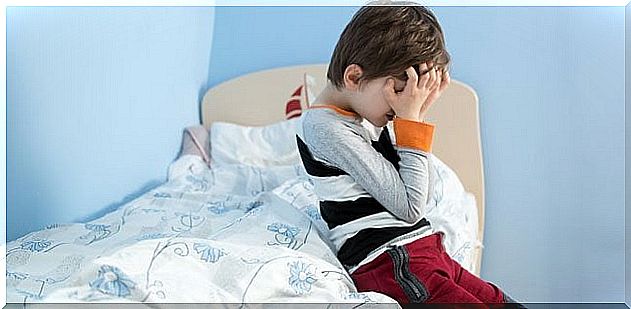The Secondary Effects Of Punishment In Children

When we leave our son without going to his favorite singer’s concert or forbid him to use the computer for a couple of days because of his behavior, we are trying to penalize his bad behavior. That is, the punishment of children seeks to suppress a series of unwanted actions. Its main advantages are two. On the one hand, it has a very fast effect and, on the other, it eliminates inappropriate behaviors and reorganizes the desired ones.
However, punishment in children produces a series of subsequent side effects that are often not considered by adults. This series of reactions, mainly emotional and behavioral in nature, makes us think that it may not be the best way to end or reduce the frequency of bad behavior.
Positive punishment
This control technique, therefore, is used to suppress certain unwanted behaviors. Specifically, we are going to focus on what is known as positive punishment. That is, in the delivery of an aversive stimulus, understood as one that has unpleasant consequences for the person who receives it.
An example of this type of conditioning could be when a child continuously bites his nails and a very bitter product is applied to make him stop. Thus, every time you put your fingers in your mouth you will have an unpleasant sensation. If you repeat it many times, you will end up giving up the habit in order not to suffer from that bitterness.

Efficacy of punishment on children
In order for the corrective to be as effective as possible, it is necessary to take into account a series of variables:
- Intensity : the relationship between intense punishment and its effectiveness is direct.
- Duration : if it is extended in time, it seems to guarantee greater efficiency.
- Contiguity : the fact that the punishment occurs immediately after the attitude or behavior to be eliminated. If the application of the aversive stimulus is delayed, the effectiveness decreases.
- Contingency : should not be withdrawn until misbehavior ceases. If it stops being punished before it has completely disappeared, there will be a short-term and very rapid recovery of the behavior. When children put us to the test with questions such as “Can you lift the punishment for me?”, You have to know how to say “no”.
- Stimulating experience: if the punishment is new for the child, it has a much more pronounced effect than if it is familiar.
- Alternative : it is important that the individual has a substitute alternative response to the one punished.
In addition, he must repair, as far as possible, the damage he has caused with his behavior. For example, if a child is playing ball at home, when his parents have told him not to do so and he accidentally breaks a vase. The father punishes him by making him clean, collect and glue all the pieces of pottery.
Disadvantages of punishment
The results of instrumental behaviorism (response – consequence) are very useful in practice. People act guided by motivations and interests, tending to repeat those behaviors or attitudes for which we obtain reward. However, when this philosophy is transferred to children’s learning, punishment of children is not always the most convenient way to educate. Some of its disadvantages are the following:
Emotional responses
The emotional state of a person who has just been punished is generally quite frustrating. It is associated with negative thoughts against the person who administers it and generates a feeling of helplessness. Therefore, a series of emotional responses can be produced, such as crying, screaming, kicking, tantrums … and even aggressive behavior. And not only addressed to the person who has administered the punishment, but also to the rest who are present.

Signal stimuli
The person administering the punishment and other stimuli in the environment may become unpleasant stimuli in their own right or warning signs that an unpleasant consequence is approaching. Therefore, the punished behavior will not appear in their presence, but in their absence. This side effect is the prototype of classroom behavior: children misbehave when there is no teacher in class, and they stop behaving like that the moment you walk in the door.
Substitution for other inappropriate behaviors
Punishment in children can also promote the substitution of punished behavior for other equally undesirable ones. Hence, it is so important to apply the sanction together with an alternative so that the child can know what is right and what is being punished. Although punishing serves to eliminate behaviors, its application causes escape behaviors and avoidance of its own consequences.
“No” to physical punishment
The person applying the lesson may overdo it. Of course, if the punishment is physical and involves the administration of a slap or slap, the effect is doubly negative. Not only because it is punishable by law, but parents are role models for their children and the example that is being given to the child by slapping him is terrible. The little ones learn everything that is taught to them. Including bad habits and wrong behaviors, even if they are corrective and aimed at correcting their behavior.
Moderation and discipline
When there are several response alternatives, and one is the undesirable that you want to suppress, you can reward the realization of any of the other answers if they are incompatible with the realization of the undesirable. This method known as differential reinforcement of other behaviors (RDO) tends to give better results in the long run than the punishment of the undesirable response.

It is important not to educate children in a constant exchange of rewards or prohibitions, because they will not learn to value being disciplined. That is, they will not do their homework because they consider that it will serve them for the future, but because they know that this way they will be able to go out on the weekend with their friends. They will give results, but they will have a good part of extrinsic motivation, memorizing without learning and looking only for the prize.
Consequently, punishment must be applied with care and moderation, because excess can turn the child into an antisocial being.









